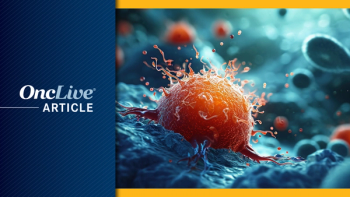
FDA Grants Fast Track Designation to AFM13 Plus AlloNK for Relapsed/Refractory Hodgkin Lymphoma
The FDA has granted fast track designation to the first-in-class innate cell engager AFM13 plus AlloNK for the treatment of patients with relapsed/refractory Hodgkin lymphoma.
The FDA has granted fast track designation to the first-in-class innate cell engager (ICE) AFM13 plus AlloNK (AB-101) for the treatment of patients with relapsed/refractory Hodgkin lymphoma, according to an announcement from Affimed.1
The combination is currently under evaluation in the phase 2 LuminICE-203 trial (NCT05883449) following investigational new drug clearance from the FDA in March 2023.2
“Our clinical data of AFM13 in combination with allogeneic NK cells has shown outstanding efficacy and a well-managed safety profile in late-stage, muti-refractory patients with relapsed/refractory Hodgkin and non-Hodgkin lymphoma,” Wolfgang Fischer, PhD, chief operating officer at Affimed, stated in a news release.1 “The FDA fast track designation is a testament to the powerful potential our combination approach may deliver for these patients in high need, and we remain committed to working closely with the FDA to expedite development of this important therapy.”
AFM13 is designed to engage the immune system’s natural killer cells and macrophages to rid the body of CD30-positive cancer cells. AlloNK is a non-genetically modified, cord blood–derived, allogeneic, cryopreserved, antibody dependent cellular cytotoxicity enhancing NK cell therapy designed for use in combination with monoclonal antibodies or ICE agents in the outpatient setting.
The phase 2, open-label, multi-cohort LuminICE-203 trial is evaluating the efficacy and safety of AFM13 plus AB-101 in patients with relapsed/refractory classical Hodgkin lymphoma and CD30-positive peripheral T-cell lymphoma (PTCL). The study will consist of a safety run-in followed by dose optimization and expansion phases.
To be eligible for enrollment, patients with Hodgkin lymphoma must have received at least two prior lines of therapy, one of which must have included combination chemotherapy, brentuximab vedotin (Adcetris), and a PD-1 inhibitor.
The trial is designed to enroll up to 24 patients with hodgkin lymphoma in the safety run-in, then between 68 and 110 in the dose optimization and expansion phases. The exploratory cohort will include 20 patients with PTCL.2
The primary end point of the study is objective response rate (ORR), and secondary end points include efficacy, durability of response, safety and tolerability, and immunogenicity of the combination.
Earlier results from the phase 1/2 AFM13-104 trial (NCT04074746) demonstrated preliminary activity with the combination of AFM13 and cord blood-derived natural killer cells in heavily pretreated patients with CD30-positive Hodgkin lymphoma and non-Hodgkin lymphoma who had received a median of 7 prior lines of therapy.
In the study, patients received 30 mg/m² of fludarabine plus 300 mg/m² of cyclophosphamide per day for 3 days, followed by an infusion of cytokine-preactivated and expanded cord blood–derived NK cells pre-complexed with AFM13 two days later. Patients received 3 additional weekly infusions of 200 mg of AFM13 prior to response assessment on day 28 by FDG-PET.
Data, which were presented at the 2022 ASH Annual Meeting, demonstrated an ORR of 94%, and a complete response (CR) rate of 71%. The combination was also well tolerated at the recommended phase 2 dose (RP2D) of 1 × 108 NK cells/kg. In the cohort of patients with relapsed/refractory Hodgkin lymphoma (n = 31) treated at the RP2D, the objective response and CR rates were 97% and 77%, respectively. Of the four patients with PTCL treated at the RP2D, 3 objective responses occurred, including 1 CR.1,3
Additionally, 18 of 33 responders who were treated at the RP2D remained in response, including 17 of 25 patients who maintained CR. Five of these patients underwent subsequent stem cell transplant as consolidation. The 6-month CR rate was 63% among patients with at least 6 months of follow-up (n = 24).
Regarding safety, in addition to myelosuppression, which is an expected adverse effect following lymphodepleting chemotherapy, patients experienced infusion-related reactions (6.8%) with AFM13 alone and with cord blood-derived NK cells precomplexed with AFM13 (1%). No dose-limiting toxicities, cytokine release syndrome, immune effector cell–associated neurotoxicity syndrome, or graft-vs-host disease occurred.
References
- Affimed receives FDA fast track designation for AFM13 in combination with Allonk for the treatment of patients with relapsed or refractory Hodgkin lymphoma. News release. Affimed. September 12, 2023. Accessed September 12, 2023.
https://www.affimed.com/affimed-receives-fda-fast-track-designation-for-afm13-in-combination-with-allonk-for-the-treatment-of-patients-with-relapsed-or-refractory-hodgkin-lymphoma/#:~:text=Mannheim%2C%20Germany%2C%20September%2012%2C,combination%20of%20its%20innate%20cell - Affimed announces IND clearance for a phase 2 clinical trial investigating AFM13 and AB-101 combination therapy. News release. Affimed. May 23, 2023. Accessed September 12, 2023.
https://www.affimed.com/affimed-announces-ind-clearance-for-a-phase-2-clinical-trial-investigating-afm13-and-ab-101-combination-therapy/ - Affimed provides updated clinical data from phase 1/2 study of AFM13 precomplexed with cord blood-derived NK cells at the ASH 2022 Annual Meeting. News release. Affimed. December 10, 2022. Accessed September 12, 2023.
https://www.affimed.com/affimed-provides-updated-clinical-data-from-phase-1-2-study-of-afm13-precomplexed-with-cord-blood-derived-nk-cells-at-the-ash-2022-annual-meeting/



































